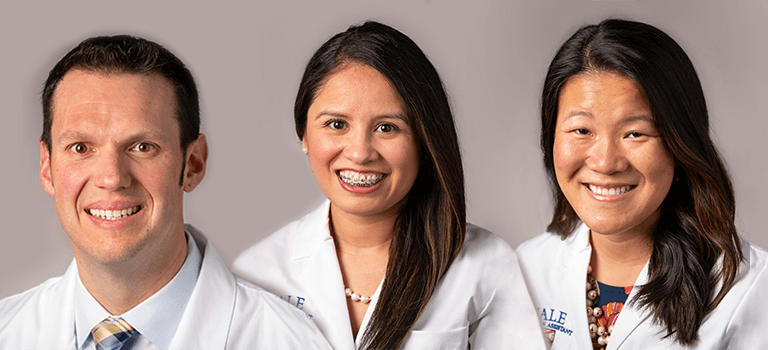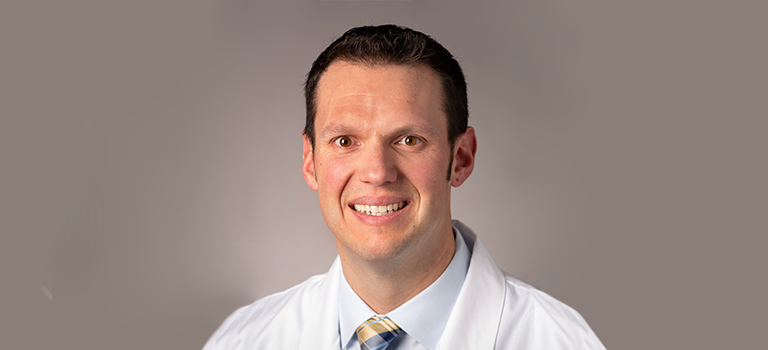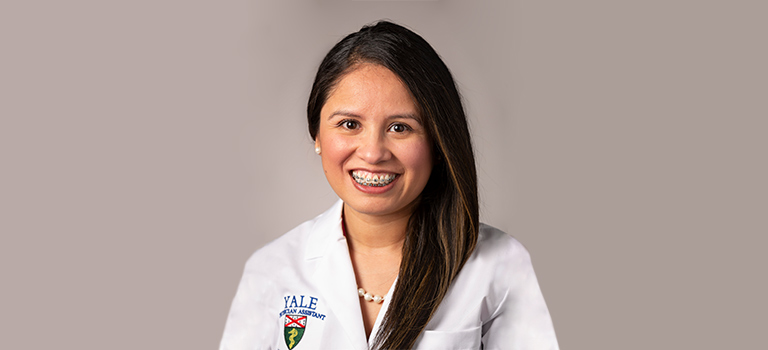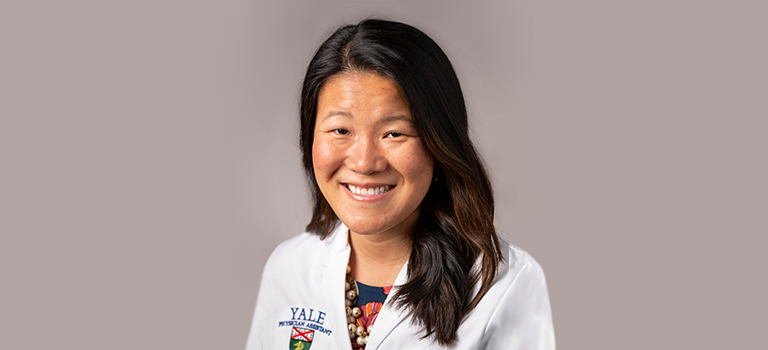Yale PA Online Students Gain Skills Through Early Clinical Experiences

“In lecture you might think hypertension management is really straight forward. Do A, then B, and then if that doesn’t work C. But in real life it can be a bit messier and needs to be tailored to the individual and their unique challenges” explains Josh Rust ’21, a second-year student in the Yale School of Medicine Physician Assistant (PA) Online Program. Rust says that the program’s Clinical Experience in Early Didactic (CEED) not only “provided context to what we were learning in our lectures,” but “also served as a real time illustration of the subtleties of medicine.”
Three months into their didactic year, students in the Yale PA Online Program begin their CEED experience, spending at least four to six hours a week in a health care clinic in their community under the supervision and mentorship of a preceptor. The students acquire 120 hours or more of direct patient care experience, which enables them to apply their classroom learning and gain important interdisciplinary experience.

Josh Rust, Class of 2021
Prior to starting the PA Online Program, Rust was a paramedic on an urban ambulance and a critical care paramedic on a helicopter. His classmate, Jinelle Jagoda ’21, worked in a preventative medicine clinic, and another classmate, Melva Navarro ’21, was a medical laboratory scientist. While they all held demanding positions prior to PA school, they found CEED to be both challenging and rewarding.
“The most challenging part was in the beginning when we had only minimal didactic knowledge. For example, it was hard to think about the management of rheumatologic disease before we had covered that unit or before we had covered some of the relevant drug classes,” Rust explains.
Jagoda echoes this sentiment, “the hardest part of CEED was to be a student who only has had three months of course work, particularly after being a professional in a field prior to PA school, ” but she found “starting off so novice also ended up being the best part about CEED, because by the end, I knew what to do in physical exams, for example, and felt prepared for my clinical year.” Rust agreed, “the most rewarding part of CEED was getting to see your didactic work pay off in the real world.”

Melva Navarro, Class of 2021
Navarro, who had no background in cardiac issues when CEED began, explained that seeing cardiac patients during CEED inspired her to learn about the topic; when she started focusing on cardiac issues in her coursework, it was terrific already to know a lot about the topic.
For Rust, Jagoda, and Navarro, their preceptors, and office teams more broadly, were central to their positive experiences.
Navarro, who was at Northwestern Medicine Regional Medical Group Geneva (Geneva, Illinois), says her preceptor “has a gift of making everyone, both students and patients, feel comfortable,” adding “she made an effort to connect my experience with my didactic coursework, for example, during cardiac, she had me listen to every patient’s heart, practicing over and over.” Navarro continues, “the whole office was just amazing in every way,” noting that the six doctors in the practice were never too busy for her and very willing to teach.

Jinelle Jagoda, Class of 2021
Jagoda, who was at Concentra Medical Centers – San Francisco Airport, is grateful for how experienced her preceptor was; he was the second PA licensed in California history and had been practicing for over 25 years, with a focus on occupational medicine. She had the opportunity to spend almost all her time during CEED with him, conducting physical exams, asking questions, and discussing diagnoses. She felt he “wanted to be a preceptor out of the kindness of his heart”
Rust’s preceptor, a physician at St. Charles Family Care, in Bend, Oregon, was also the head of the family medicine division of the health system. Rust says that “because of his role in the big picture elements of health care, I was able to get a unique introduction to quality measures and process improvement.” Rust appreciated the interprofessional exposure he also received, “our clinic was fortunate to have behavioral health professionals as part of the clinic staff, so I was able to interact with them quite a bit, as well as the doctors, nurses, and medical assistants. We also had nurse coordinators that helped with more complex patients, it was great to see their role in the ongoing care of the most vulnerable patients.”
The CEED experience exposed the students to a wide range of patients and issues, over many months. St. Charles Family Care was focused on the high quality delivery of primary care, and Rust saw patients of all ages from all socioeconomic groups. He noted that “given the longitudinal nature of CEED, it was fun to see patients back over the year and watch them succeed.”
Similarly, a highlight for Navarro was seeing an infant have a three-month and six-month wellness exam, and on the last day of CEED, getting to participate in the nine-month exam. Because she was at the clinic every Tuesday, there were several patients who she had the chance to see repeatedly. Navarro, a native Spanish-speaker, also appreciated having the opportunity to use her language skills during CEED, something she hopes to continue doing after she graduates, ideally working in a family practice in an underserved community.
In addition to all her work with patients, Jagoda found it interesting to be exposed to occupational health, and “learn about all the paperwork required in workers compensation cases, and walk the patient through the logistics.”
Rust also found CEED “provided a framework for communicating with patients and managing a patient encounter. Things like timing, organization, and setting expectations for the visit are hard to learn in a classroom. It was great to see a practicing professional manage their day and get to try it out myself.”
All three students felt better prepared and more confident for their clinical rotations after CEED. As Rust describes, “CEED allowed me to hit the ground running.”
Citation for this content: Yale School of Medicine’s Physician Assistant Online Program

